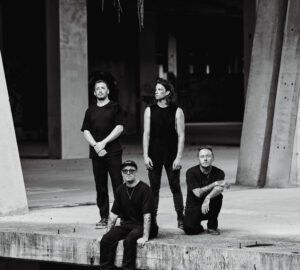Brighton’s Architects are, with the possible exclusion of their slight miststep in 2011 with The Here and Now, one of modern metal’s most reliable and consistent acts.
Though sticking to a basic formula, it could be argued that Architects also define themselves by, if not reinvention, then by experimenting with their established sound. Look at the difference, sonically, between the band’s two most lauded records: 2009’s Hollow Crown and 2012’s Daybreaker. Even The Here and Now was an experiment with a more commercially viable brand of metalcore.
It comes as a surprise, then, that All Our Gods Have Abandoned Us is essentially Lost Forever // Lost Together part 2. This shouldn’t be all that surprising, given Architects worked with producers Henrik Udd and Fredrik Nordström on both records, but it’s striking how much it does resemble the previous album. However, the band exude enough quality to make this familiar-sounding record work, and in fact, manage to develop this sound further.
The album opens with the yowl that kicks off Nihilist, a no-nonsense thrasher easily able to stand among Architects’ heaviest tracks. It pulls the listener right into the heat of the moment, before slowing down for a slightly more mellow bridge, exemplifying Architects’ interesting approach to songcraft.
Singles Downfall and Phantom Fear are highlights, with the former’s refrain of ‘They want one for all…’ being up there with Architects hooks like Naysayer’s ‘We’re all on own…’ and These Colours Don’t Run’s ‘So repeat this lie…’. Phantom Fear is simply a heavy, well-written Architects song with a healthy dose of Sam Carter shouting ‘BLEH’, a welcome feature that was present on LF // LT that is also recurring throughout AOGHAU.
Most of the rest of AOGHAU follows the Phantom Fear mould, and it works for the most part, despite a few forgettable tracks. Fortunately, however, there are more Phantom Fears and Gone With the Winds than there are The Empty Hourglasses.
Thankfully, AOGHAU changes things up just as this is about to become grating, with the slightly off-kilter All Love Is Lost. It’s not a total departure, but its strange, unsettling atmosphere manages to add a bit of variety to AOGHAU. Into the Wilderness continues this trend and carries a slight post-rock influence, especially in its opening passage, but is overall a weaker track than All Love Is Lost, which is a shame because its interesting ideas simply add up to less than the sum of its parts.
The album closes with the stunning Memento Mori, Architects’ longest and most ambitious track to date. Its first section is filled with atmospheric electronics, with the track restraining itself for a minute and a half before any guitars or harsh vocals appear. The track intersects a return to these electronics with samples from the speeches of philosopher Alan Watts; and heavier parts more akin to Architects’ usual fare. In fact, Architects are simultaneously both their most heavy and aggressive; and their most reserved and calculated on Memento Mori,with its 8-minute run time allowing for a showcasing of all of Architects’ best qualities. There’s even a black metal influenced blast beat around five minutes and 40 seconds in – not long before returning to electronics-based ambience.
Overall, despite its sameness to LF // LT, AOGHAU still sounds fresh. It’s not as if the style displayed by Architects on their previous album was stale, or is stale now, and surely a band like themselves will switch things up before it becomes so, and tracks like the closer show that the band is still capable of progression. In some places, the songwriting on display on AOGHAU is an improvement over LF // LT, so much so that had LF // LT simply not come first, this album would probably be rated higher than it. However, if the quintet continue down this path, it could be interpreted as laziness. Despite this, we have every confidence that album number eight will give us another, newly evolved version of Architects.
7.5/10
Standout Tracks: Downfall, All Love Is Lost, Memento Mori
For Fans Of: While She Sleeps, Meshuggah, Bleed From Within
Written by: Alan Cunningham




